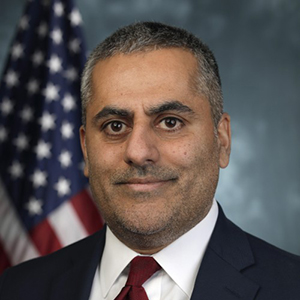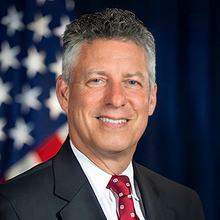AI Gov: Data Insights
AI can transform the way government captures and uses data. But federal agencies are still sitting on hoards of data to demystify, and with new data insights and faster decision-making comes a host of ethical and privacy questions. This event will consider new strategies for capitalizing on data as well as the ethical and privacy considerations associated with AI.

Speakers / Panelists
-
 Michael Hoffman President GovCIO Media & Research
Michael Hoffman President GovCIO Media & Research
As federal agencies adopt AI to decipher treasure troves of data, they need a plan to maintain best practices as well as ethics and privacy standards. During this fireside chat, we’ll hear how the U.S. government can pave the way to transform national security, research and development, and the workforce with AI.
Speakers / Panelists
-
 Anil Chaudhry Director, Federal AI Implementations, IT Modernization Centers of Excellence GSA
Anil Chaudhry Director, Federal AI Implementations, IT Modernization Centers of Excellence GSA -
 Amy Kluber Editorial Director GovCIO Media & Research
Amy Kluber Editorial Director GovCIO Media & Research
AI can assist federal procurement by streamlining the RFI process, helping ensure compliance, and improving data reporting. In this panel, IT leaders will discuss their challenges, successes and progress with using AI for procurement.
Speakers / Panelists
-
 Mike Cook General Manager, Public Sector Icertis
Mike Cook General Manager, Public Sector Icertis -
 Scott Simpson Digital Transformation Lead, Procurement Innovation Lab DHS
Scott Simpson Digital Transformation Lead, Procurement Innovation Lab DHS -
 Chief Procurement Officer IRS
Chief Procurement Officer IRS -
 Moderator Michael Hoffman President GovCIO Media & Research
Moderator Michael Hoffman President GovCIO Media & Research
AI can improve mission integrity by quickly sorting and prioritizing data for federal officials to make prompt, sound decisions. From cybersecurity to law enforcement to improving service delivery, there are dozens of ways federal agencies can use AI to support their missions. Hear from federal officials about how they’re using AI to transform the way they do work.
Speakers / Panelists
-
 Ken Clark Chief Data Officer, ICE DHS
Ken Clark Chief Data Officer, ICE DHS -
 Gina Ligon National Counterterrorism, Innovation, Technology and Education (NCITE) Center of Excellence DHS S&T
Gina Ligon National Counterterrorism, Innovation, Technology and Education (NCITE) Center of Excellence DHS S&T -
 Adan Vela Assistant Professor of Industrial Systems and Engineering, NCITE Center of Excellence DHS S&T
Adan Vela Assistant Professor of Industrial Systems and Engineering, NCITE Center of Excellence DHS S&T -
 Moderator Kate Macri Staff Writer/Researcher GovCIO Media & Research
Moderator Kate Macri Staff Writer/Researcher GovCIO Media & Research
The rapid, widespread adoption of AI throughout the .gov landscape opened a Pandora’s box of ethics and privacy concerns. Health-focused organizations in the public eye face heightened scrutiny, especially when dealing with national crises like the COVID-19 pandemic. Experts discuss how health professionals can ensure compliance with ethical and privacy standards while making the most of AI.
Speakers / Panelists
-
 Katherine Blizinsky Policy Director, All of Us Program NIH
Katherine Blizinsky Policy Director, All of Us Program NIH -
 Tina Hernandez-Boussard Associate Professor Stanford University
Tina Hernandez-Boussard Associate Professor Stanford University -
 Moderator Melissa Harris Staff Writer/Researcher GovCIO Media & Research
Moderator Melissa Harris Staff Writer/Researcher GovCIO Media & Research
Speakers / Panelists
-
 Michael Hoffman President GovCIO Media & Research
Michael Hoffman President GovCIO Media & Research
-
 Katherine Blizinsky Policy Director, All of Us Research Program, NIH
Katherine Blizinsky Policy Director, All of Us Research Program, NIH -
 Anil Chaudhry Director, Federal AI Implementations, IT Modernization Centers of Excellence, GSA
Anil Chaudhry Director, Federal AI Implementations, IT Modernization Centers of Excellence, GSA -
 Ken Clark Chief Data Officer, ICE, DHS
Ken Clark Chief Data Officer, ICE, DHS -
 Mike Cook General Manager, Public Sector, Icertis
Mike Cook General Manager, Public Sector, Icertis -
 Tina Hernandez-Boussard Associate Professor in Medicine (Biomedical Informatics), Stanford University
Tina Hernandez-Boussard Associate Professor in Medicine (Biomedical Informatics), Stanford University -
 Melissa Harris Staff Writer/Researcher, GovCIO Media & Research
Melissa Harris Staff Writer/Researcher, GovCIO Media & Research -
 Michael Hoffman President, GovCIO Media & Research
Michael Hoffman President, GovCIO Media & Research -
 Amy Kluber Editorial Director, GovCIO Media & Research
Amy Kluber Editorial Director, GovCIO Media & Research -
 Gina Ligon Director, National Counterterrorism, Innovation, Technology and Education Center of Excellence, DHS S&T
Gina Ligon Director, National Counterterrorism, Innovation, Technology and Education Center of Excellence, DHS S&T -
 Kate Macri Staff Writer/Researcher, GovCIO Media & Research
Kate Macri Staff Writer/Researcher, GovCIO Media & Research -
 Scott Simpson Digital Transformation Lead, Procurement Innovation Lab, DHS
Scott Simpson Digital Transformation Lead, Procurement Innovation Lab, DHS -
 Adan Vela Assistant Professor of Industrial Systems and Engineering, NCITE Center of Excellence, DHS S&T
Adan Vela Assistant Professor of Industrial Systems and Engineering, NCITE Center of Excellence, DHS S&T -
 Chief Procurement Officer, IRS
Chief Procurement Officer, IRS


